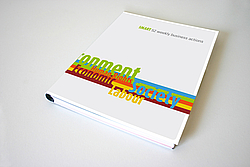
Do SMART Business – Week by Week booklet
FOSTERING AND COMMUNICATING PRODUCT CHAIN INFORMATION
Small and Medium sized Enterprises (SMEs) are a major source of waste and emissions of CO2 and account for up to 90% of global industrial output. SMEs are also the biggest source of employment, economic development and innovation in local societies. They represent the backbone of many economies and are the key to sustaining industrial value chains. However, due to their limited size and access to financial resources SMEs are often operating with outdated technology which hampers their capacity to remain competitive in local and regional markets. Incremental changes over time would nevertheless enable SMEs to sustain their position and even assist this important sector to develop a more sustainable business style with reduced pollution and safer working conditions.
One Action Each Week
The CSCP has developed a self-help guidebook entitled “Do SMART Business – Week by Week” for small and medium-sized enterprises (SMEs). This guidebook aims to introduce the basics of environmental practice and social responsibility for managers and employees of SMEs in all areas of the world, and includes related examples, commentary, and tips for action. The guidebook suggests easily accessible tools to improve daily business practices and increase business competitiveness. As a component of a broader “SMART” project, the “Do SMART Business” guidebook has been developed on the basis of experiences with the Efficient Entrepreneur Calendar but with an expanded scope to include both eco-efficiency as well as broader corporate responsibility issues.
Working with the guidebook
The objective is to provide a tool that can reach new audiences, in particular managers and employees working for SMEs that may not yet be familiar with sustainable development issues. The guidebook is designed to provide 52 actions (one per week) with each action being presented on a double page containing short texts and an illustration to attract the reader’s attention. The text is written in an easily accessible style, avoiding jargon, and using visually engaging images. Additional information links or tools are also provided to assist SME managers and employees. A self-evaluation tool is provided at the end of the guidebook to enable SMEs to measure their achievements.
Use it for Trainings
The content of the SMART guidebook is divided into 5 core areas that are intended to form the basis of SME training modules. The CSCP welcomes enquiries regarding additional information on the continued work within the SMART project or to discuss SME sustainability training opportunities.
The 52 weekly actions will also be accessible as an E-learn tool within the SWITCH-Asia Programme Network Facility www.switch-asia.eu from October 2010 onward.
Background
The CSCP has drafted the SMART guidebook with financial support from UNEP.

For more information please contact:
Michael Kuhndt • Director of the CSCP
+49 (202) 459 58 20 • michael.kuhndt@scp-centre.org
